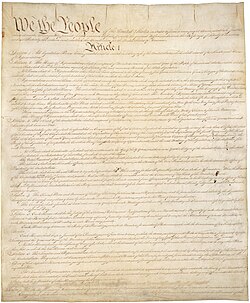Belief that the U.S. Constitution limits the powers of government to protect civil liberties

Constitutionalism in the United States is the framework of principles and practices that uphold the United States Constitution as the supreme law of the land, guiding governance and protecting individual rights. [1] It emphasizes the rule of law, separation of powers, checks and balances, judicial review, and federalism, rooted in Enlightenment ideals of liberty and governance by consent. [2] Since its ratification in 1788, the Constitution has shaped American political, legal, and cultural development.
Contents
- Historical background
- Origins and influences
- Ratification and early debates
- Core principles
- Rule of law
- Separation of powers
- Checks and balances
- Judicial review
- Federalism
- Individual rights
- Constitutional interpretation
- Originalism vs. living constitutionalism
- Landmark cases
- Contemporary issues
- Security vs. liberty
- Federalism disputes
- Judicial independence
- Amending the Constitution
- Global influence
- See also
- References
- External links
